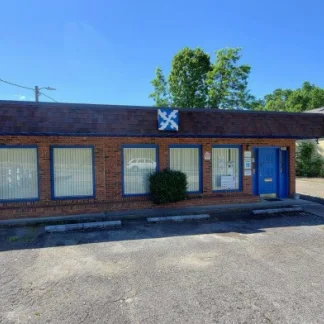Woodridge Psychological Associates
Woodridge Psychological Associates is a private rehab located in Marion, North C...
Crossroads Recovery Center, in Marion, North Carolina, is an outpatient alcohol and drug rehab for adolescents and adults. They offer dual diagnosis care, medical and mental health assessments, medication management, aftercare support, and specialized programming for young adults, teens, military personnel, Spanish speaking clients, and persons with HIV/AIDS.
Crossroads Recovery Center is an outpatient drug and alcohol rehab for adults in Marion, North Carolina offering dual diagnosis care and intensive outpatient (IOP), standard outpatient, and aftercare services. Specialized programming is available for Spanish language speakers, adolescents, young adults, military personnel, and persons with HIV/AIDS.
The outpatient program at Crossroads Recovery Center uses a step down approach to foster a robust continuum of care aligned with clients’ evolving needs. Their levels of care include intensive outpatient (IOP), standard outpatient, and aftercare programming. Clients receive medical and mental health assessments, personalized care planning, and comprehensive case management. They also engage in intensive, trauma informed individual, group, and family counseling drawing on proven modalities, including CBT, DBT and RBT. The program prioritizes recovery focused life skills training and aftercare support. Referrals for medical, mental health, legal, and social service programs are available for alumni.
Crossroads Recovery Center accepts private insurance, Medicaid, and self pay. Financial aid is available.
Contact us for more information: (828) 659-8626

Connect with Crossroads Recovery Center by calling their admissions team directly.
(828) 659-8626 Website Get DirectionsResearch clearly demonstrates that recovery is far more successful and sustainable when loved ones like family members participate in rehab and substance abuse treatment. Genetic factors may be at play when it comes to drug and alcohol addiction, as well as mental health issues. Family dynamics often play a critical role in addiction triggers, and if properly educated, family members can be a strong source of support when it comes to rehabilitation.
Group therapy is any therapeutic work that happens in a group (not one-on-one). There are a number of different group therapy modalities, including support groups, experiential therapy, psycho-education, and more. Group therapy involves treatment as well as processing interaction between group members.
Trauma therapy addresses traumatic incidents from a client's past that are likely affecting their present-day experience. Trauma is often one of the primary triggers and potential causes of addiction, and can stem from child sexual abuse, domestic violence, having a parent with a mental illness, losing one or both parents at a young age, teenage or adult sexual assault, or any number of other factors. The purpose of trauma therapy is to allow a patient to process trauma and move through and past it, with the help of trained and compassionate mental health professionals.
Group therapy is any therapeutic work that happens in a group (not one-on-one). There are a number of different group therapy modalities, including support groups, experiential therapy, psycho-education, and more. Group therapy involves treatment as well as processing interaction between group members.
Trauma therapy addresses traumatic incidents from a client's past that are likely affecting their present-day experience. Trauma is often one of the primary triggers and potential causes of addiction, and can stem from child sexual abuse, domestic violence, having a parent with a mental illness, losing one or both parents at a young age, teenage or adult sexual assault, or any number of other factors. The purpose of trauma therapy is to allow a patient to process trauma and move through and past it, with the help of trained and compassionate mental health professionals.
Trauma therapy addresses traumatic incidents from a client's past that are likely affecting their present-day experience. Trauma is often one of the primary triggers and potential causes of addiction, and can stem from child sexual abuse, domestic violence, having a parent with a mental illness, losing one or both parents at a young age, teenage or adult sexual assault, or any number of other factors. The purpose of trauma therapy is to allow a patient to process trauma and move through and past it, with the help of trained and compassionate mental health professionals.
Woodridge Psychological Associates is a private rehab located in Marion, North C...
McLeod Addictive Disease Center, located in Marion, North Carolina, offers behav...